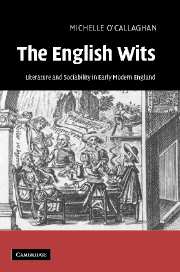Book contents
- Frontmatter
- Frontispiece
- Contents
- Acknowledgements
- Note on the text
- Introduction
- Chapter 1 Gentleman lawyers at the Inns of Court
- Chapter 2 Ben Jonson, the lawyers and the wits
- Chapter 3 Taverns and table talk
- Chapter 4 Wits in the House of Commons
- Chapter 5 Coryats Crudities (1611) and the sociability of print
- Chapter 6 Traveller for the English wits
- Chapter 7 Afterlives of the wits
- Notes
- Bibliography
- Index
Chapter 1 - Gentleman lawyers at the Inns of Court
Published online by Cambridge University Press: 22 September 2009
- Frontmatter
- Frontispiece
- Contents
- Acknowledgements
- Note on the text
- Introduction
- Chapter 1 Gentleman lawyers at the Inns of Court
- Chapter 2 Ben Jonson, the lawyers and the wits
- Chapter 3 Taverns and table talk
- Chapter 4 Wits in the House of Commons
- Chapter 5 Coryats Crudities (1611) and the sociability of print
- Chapter 6 Traveller for the English wits
- Chapter 7 Afterlives of the wits
- Notes
- Bibliography
- Index
Summary
The early convivial societies were shaped at a fundamental level by the fact that many of the participants had been trained at the Inns of Court. The convivium held at the Mitre tavern and the Sireniacal fraternity were dominated by men from the Middle Temple and its ancient ally Lincoln's Inn. That the early history of the private society is closely associated with the Inns of Court derives from their status as a voluntary professional society and a physical community that brought together a body of educated, élite men. The Inns were instrumental in the Tudor civic renaissance, which witnessed the emergence of different forms of association, including the early convivial societies. The Inns have a unique institutional status within this history of associations. Unlike guilds or the universities, they had never been incorporated by royal charter, had no legal existence as a corporate body, nor were they bound together by a written constitution. Instead their corporate identity resided in acts of living and working together as a professional fraternity, and relied on rituals and cultural fictions to bind individuals in a voluntary contract. The performance of contracts of fellowship began with entry into an Inn. The student was sponsored by ‘two others formerly admitted of the House, [who] enter into Bond with him, as his sureties, to observe the Orders, and dischardge the duties of the House’.
- Type
- Chapter
- Information
- The English WitsLiterature and Sociability in Early Modern England, pp. 10 - 34Publisher: Cambridge University PressPrint publication year: 2007

